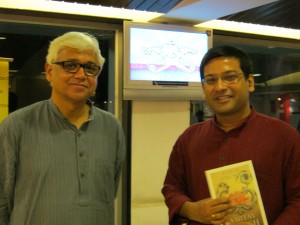[The pictures in this post were taken by Suhas Ganguli]
Dear Amitav Sir,
I hope this letter finds you well as it leaves me at present. I am a
young Pediatrician from Kolkata and an avid reader of your works. I
was first introduced to your writings by my cousin Sharmistha Misra,
then a postgraduate student of English Literature in the University of
Calcutta. She gifted me a copy of The Hungry Tide and from that point,
I have found myself forever immersed in anything that came from your
pen.
Within two weeks of finishing the book-which I did over a span of four
nights-I felt compelled to visit the Sunderbans where I really saw
Hungry Tide rise high. The enormous ecological wealth of the Bhaanti-r
Desh was enlivened in my mind by the novel. As you know, a visit in
the capacity of a weekend tourist allows little opportunity to
interact with the local community, it was not too difficult for me to
imagine the very human faces of Fokir, Moyna and Nirmal and their
dreams, aspirations, love, hopes, hopelessness, endurance and every
other attribute that so vibrantly decorate your characters. In this
context, I must mention that I realised firsthand the importance of
preservation of biological and ecological character of the place,
which you had also underlined in an essay written years ago in
response to a proposal to the erstwhile Govt of West Bengal, from the
Sahara Group asking to set up a Tourism Hub in the region. Not the
least of the reasons were the fact that the purity of the Sunderbans
had never been about the flora and fauna alone, it is and always has
been very much about human existence and lives, a countless of them
having been lost in the events that followed the forced eviction at
Morichjhaanpi.
It has been twenty five years since Alu was able to weave his first
Lokkhoheerabuti Jamdani-a remark that I made when I got the prized
opportunity of my lifetime to meet you in person in an event in
Kolkata earlier this year-but in all your works that followed ever
since, what strikes me most is your constant and increasingly engaging
ability to blend travels, that move as much in space as they do in
time, in the panoramic scale of human history with characters that
create an almost household immediacy around them. This is uniquely
testimonial of your genre, the only familiar (to my limited knowledge
of literature) exponent of the same being Sharadindu Bandypadhyay, the
createor of “Sadasib-er Golpo” among many other historical fictions in
Bengali.
After all these years my mind is still filled with thoughts of
Rajratan, not the preadolescent boy growing up with Malati and
threatening to leave to look for Neel in the Seas as he does in River
of Smoke, but the child waiting expectantly for him in the terrace of
Raskhali Rajbari with a kite that never flew again. Who can forget the
thrill of being able to precisely invent imaginary places, depicted in
The Shadow Lines or fail to ponder over the futility of geographical
and political boundaries enshrined in the remark-“It is this that sets
apart the thousand million people who inhabit the subcontinent from
the rest of the world-not language, not food, not music-it is the
special quality of loneliness that grows out of the fear of the war
between oneself and one’s image in the mirror.” Or for that matter, I
wonder how many of us did not share King Thibaw’s sense of loss when
he noticed that the chariot’s ceremonial canopy had seven tiers, meant
for a nobleman and not nine, due to the King. The Calcutta Chromosome
always holds a special place close to my heart because of its
premises, one such being PG the Hospital-now IPGMER and SSKM
Hospital-where I had my Postgraduate training and not the least
because I someday hope to find a Murugan in me, with you singularly
occupying Sir Ronald Ross’s throne!
I had planned to pen this letter many months ago but could not do it
as I was occupied with the deadlines of the United States Medical
Licensure Examinations and I wanted to write it with my undivided and
unbroken attention. Also, the timing could not have been more
interesting and personally relatable for me as I am now in the USA
travelling to seek specialised professional training. It is this
transit of thousands of miles from my home at Chinsurah on the banks
of Hooghly and anticipation that usually characterise these First
Journeys that makes palpable to me the feelings that crossed the minds
of Deeti, Zachary, Neel and even maybe Bahram, when he arrived at
Canton for the first time. It also reminds me of my Uncle, Late
Biswajit Ganguli, a painter, and his great journey that took him,
initially on a cargo vessel called ‘Damra’, then by hitch-hiking, and
sometimes on foot with his pencils and paintbrushes funding his trips,
to places including Bombay, Bahrain, Egypt, England, Germany and
finally to a Danish suburb, a few miles off Copenhagen, where he spent
a good part of his life.
Another aspect of your works of fiction that enthrals us is the
confluence of academic brilliance, scholarship and thorough research
that they sparkle with. The enormously formidable ability to deal
with subjects as diverse like anthropology, human history, marine
biology, horticulture and gardening, art history and nautical
sciences, all at the same time, to this degree of precision and
detailing is perhaps non-existent in any other author of any age and
time.
Sir, I am a small and insignificant man with even smaller fund of
literary knowledge. But after River of Smoke it has been impossible
for me to let go of the characters that I have come to love so
earnestly, not much unlike long known friends or members of one’s own
extended family. Therefore the possibility of extension of the Ibis
trilogy to a quintet or even an octet appeared as the ray of hope that
instantly illuminated a fan’s expectant mind. My personal favourite is
Neel but in River of Smoke I missed Baboo Nob Kissen, Kalua and
Zachary very much.
Here I must add that I am enclosing two pictures with this letter. The
first one was taken at the time of my travel to the Sunderbans and I
have taken the liberty to name it The Hungry Tide after your book. The
second photograph captured the most precious moment of my life which
gave me the opportunity to meet you in person in Kolkata. Any
acknowledgement that ‘The Amitav Ghosh’ has read this letter and seen
the photographs will mean the world to me.
Finally, before I conclude this communication, I want to tell you
something borrowing your own words, (the ones that you wrote for
Satyajit Ray, another great son of India) which my feeble memory may
not be able to reproduce verbatim, “In ancient Japan it was a custom
to pay homage to a great artist by standing outside his house alone
and in silence till one is invited inside.” Sir, you are the only
person in the whole world for whom I am willing to do that.
With Bijoyar Pronam and regards,
Respectfully yours,
Suhas Ganguli



Dear Suhas,
What a beautiful letter. Brought tears to my eyes by the end of it..
It is so good to get to know someone who shares similar passion for someone’s work!
Very inspiring letter. Especially the quote at the end.
Thanks
Anupam
Dear Anupam,
I am really sorry for not being able to post a timely reply to your comment.
Coming to the topic of letters, I had a particularly noteworthy observation while reading River of Smoke-letters can be beautiful and extremely vivid mediums of narratives. Recently when I was reading William Dalrymple’s The Last Mughal I found that this book also has extensive use of letters-mostly reproduced verbatim and/or translated from ‘The Mutiny Papers’ from National Archives, New Delhi-to advance the narrative.
Thank you very much for going through my letter. Your appraisal was a huge encouragement.
Regards,
Suhas
Suhas dha,
The thing is we share a same heart, same love for our favourite author.